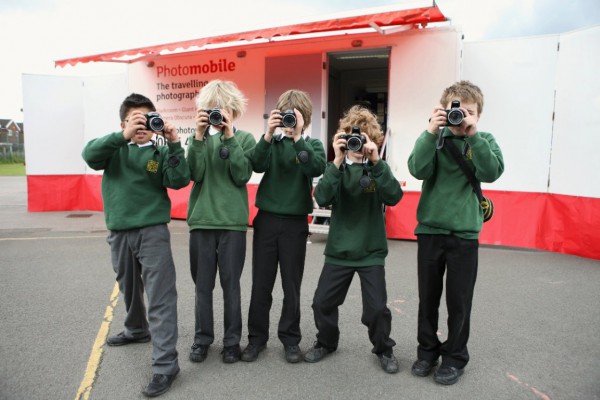The mobile darkroom is primarily focussed on inspiring young people or community groups, through the medium of Photography. This can be informal learning or can be more structured to incorporate the National Curriculum or aims of a particular project.
As an introduction we have outlined some sample sessions and below you will find brief summaries of each. Please bear in mind these are no more than a guide, to whet the appetite and get your ideas going.
The photographers and workshop leaders involved in the unit have a wealth of experience in the education and training sectors and can advise on the most appropriate content for a workshop or activity day.
Sessions can, of course, be custom planned to suit your requirements.

School Activity Day
Sessions with school groups can be adapted to suit age ranges from Key Stage 1 through to Key Stage 4, with some consultation. These can be based around a full day or long half-day, depending on the size of the group and planned activity.
You might have a class of learners who are themselves studying photography (at GCSE or AS, A2) but yet lack access to the full range of resources.
Equally, a session in Photomobile can be used as a way of bringing diversity to other areas; for example in the Key Stage areas of Science, Information and Communication Technology, Design Technology, Art & Design and even History there is the potential to incorporate the unit as a learning resource.
Community & Groups Workshop
These workshops are highly adaptable. The intention with them is to provide an engaging, informative and inspiring day for a group of people with a common interest or background (including post-16 education).
To give direction to the days we offer a number of live briefs or assignments. These can either be chosen by the workshop coordinator at the host organisation or by the group, under a tutor/leader’s direction, as part of the session itself (with the exception of the Fashion Shoot, which must be pre-booked because of additional resourcing).
The following are some potential themes:
The Portrait – seemingly an easy concept to understand (a portrait) this workshop of course takes people as its subject but the potential here is far greater. Issues of identity, self-expression and representation can also be addressed through this workshop theme.
Picture Story – one of the strongest aspects to photography is its ability to convey a message, to tell a story. Working with a group, the session leader would define a theme (or themes) for the group to explore, the end result being a series of images that explore the subject chosen in an inventive or thought-provoking way.
Fashion Shoot – depending on the age range and cognitive abilities of a group this session can be made quite challenging, with the use of portable photographic lighting. As with the portrait workshop there are opportunities to explore issues and subjects, as well as simply provide an entertaining and engaging session.
Words & Pictures – with Words & Pictures we go beyond photography and look at the use of text with image and also the basic concepts of desktop publishing and design. The end result of such a session might be a newsletter, flyer or poster that may be linked to a group’s specific interests.
